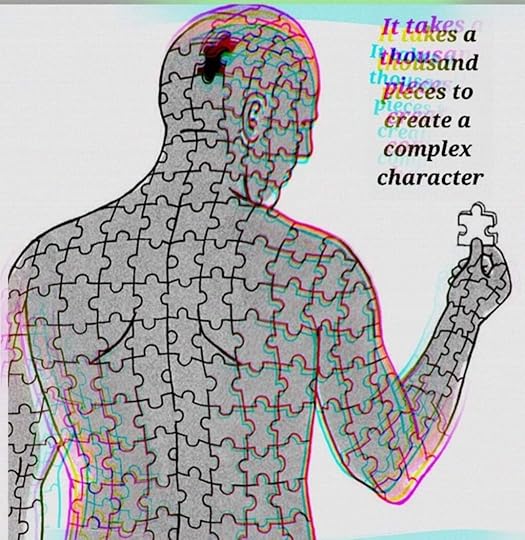I, Character

As a writer, I am often mistaken for my characters. But while it is true that we share many of the same characteristics, motivations, music preferences, and language patterns, I am not my characters and they are not me.
The similarities are easy to explain: we all share a brain.
This means I have clarity about each character’s motivations, fears, frustrations, goals, and desires. That doesn’t mean those aspects are carbon copies of my personality traits. You see, once the pieces start coming together, something amazing happens. The character takes on a life of its own. At that point, it begins to create pieces for itself. It embarks on a path that may take it far from the destination I intended and starts a butterfly effect that can change the entire novel.
I LOVE it when that happens. It means I’ve done something right. Characters grow and expand away from their “mini-me” mold and shatter it into a thousand pieces. Then they gather those shards to create a mosaic that is all their own. While I share similarities with pieces of the character, they are wholly original.
In Plague of Lies, I understand Lauren’s feelings of not being wanted, but I’m not a retro-goth-glam girl who was abandoned by her father and bullied her whole life. I didn’t spend my senior year living in an RV in the backyard after my grandfather moved into the house and didn’t jump on a bus at 18 to hunt down my birth father. That’s Lauren, not me.
I get Caroline’s frustrated exhaustion in Twists, Turns, and Curves. I too spent years as a professional educator living in poverty, thinking I was doing it for God’s glory. But I’m not nearly as talented as Caroline. I’d be completely lost in her alternate profession. It took me years to discover a new career for myself.
I felt closest to Julia Williams when writing her story in No Longer Invisible because I too believed there was safety in invisibility. I didn’t have to worry about out-of-control physical abuse, though. I learned to keep my head down so it didn’t get bitten off. I tried to stay quiet, but it wasn’t my personality, so my silence would erupt in explosions of awkwardness. I still fight that anti-social part of myself that isn’t quite sure how to behave. Julia more easily embraces the gift of reclaiming power through quiet observation.
As for Ally James? I’m not a semi-retired model who is now part owner of a fabulous line of curvy girl boutiques (although the AXIOm system is definitely mine). In fact, I’m less like Ally than any of my MFCs and that’s okay. It’s more like she’s who I can aspire to be — hard-working and empathetic. But, when it comes to the MMC of the novel, I can easily relate. I’ve had triggers activated in public. I’ve had anxiety and panic attacks creep up on me out of the blue; wheels set to spinning with no more provocation than an errant thought. But I’m not a bookstore owner in a mountain-top city dealing with vestiges of trauma left by sexual abuse.
Kelly Taylor and I share many similarities — to the point where close friends who have read Wise and Mighty declare confidentiality that we are one and the same. But we’re not. Kelly is more outspoken than I am. She’s more confident in her abilities. Kelly has the opportunity to be a leader and she does it well. Me? Not so much.
I speak up primarily through novels. They are how I attempt, in my small way, to lead. To shout.
Because I wrote each book in “real life,” they can’t help but follow the thread of my own experiences. I too witnessed betrayal and cover-up at the leadership level of a church. I saw the righteous anger it sparked. I experienced its destructiveness.
After a decade-and-a-half of living in poverty conditions while working as a professional educator, my husband and I were finally making enough money to breathe. Of course, it also meant he was never off the clock and a large chunk of our pay went to helping another struggling teacher's family.
As a young mom, I read To Train Up a Child and was horrified that my church would endorse it. I couldn’t understand why anyone would use what was obviously a punishment-based puppy-training manual on their child. But, I knew people who did. Since they were church leaders and the book was church-recommended, I didn’t understand at the time that what I was seeing was abusive. Now I do. I can’t go back in time and fix my reactions, but I can apologize for my part in a child’s pain and give proper words to what they’ve gone through. It wasn’t discipline. It wasn’t even punishment. Spanking a child until they cry “properly and with a broken spirit” is abuse.
As a writer of books centered on recovery from spiritual abuse, I use my own journey as a template, but listening to others as they reveal their own experiences has made me more empathetic. Not everyone can tell their stories. Not everyone has the words. Thankfully, safe spaces are becoming more available. Readers can message an author and say, “I saw myself in that character. I went through something similar. I’m making changes so I can live my best life.”
This brings me to my own changes that are reflected in Wise and Mighty. I too occupied a different emotional, mental, and spiritual state than my spouse when it came to dealing with issues in our denomination. I once felt the way he did. I believed there were enough good people to save what I was convinced to be a God-ordained system. For years I worked within those set parameters to change things for the better, but after three decades of attending and working for what I thought was God’s ministry, I finally realized that the organization was more about propping up church leadership. Once that piece fell into place, I could finally understand the lack of Bible preaching and teaching, the push for attendance numbers, the exaggeration of our church’s influence and outreach, the constant fawning over men with bigger ministries, and the quiet determination to keep women in their place with exaggerated flattery and lack of real leadership roles.
I left. I got out. That was when I could finally acknowledge the toxic system I’d been a part of.
I wish I could have lived Kelly’s resolution, but it was not to be. Instead, I watched my sons move out of state, in large part to protect their families. I watched my husband struggle with the knowledge that I might be right even as he continued working nearly 60 hours a week in full-time Christian service.
He finally got out, and like our sons, we too moved away. Away from our “forever home.” Away from my amazing sister (who I miss every day). Away from our few cherished friends. We were able to move close to one son, but the other is on the opposite side of the country.
Kelly got to keep her church family. She got to build and rebuild friendships. She got to protect her family and keep them close by. She got to be a spiritual leader in a church that actually WANTED to do better, whose pastor created a safe space where people could worship, fellowship, and learn together. Kelly gets the dream and I couldn’t be happier for her.
But like all of my other main characters, Kelly is not me.
As a writer, I don’t get a happily ever after. Instead, I get more pieces. Some belong to the puzzle of the plot, others to setting. But, the pieces that come together first belong to yet another character. I may not know who it is at the beginning, but I’ll add a piece of myself here and there until enough of me is in the mix to bring her to life. At that point, I’ll watch as she claims her own power to tell her own story. She will become someone else.
Not me.
https://www.amazon.com/kindle-dbs/author/ref=dbs_m_mng_wam_byln?_encoding=UTF8&asin=B0964C6MMN
[image error]


